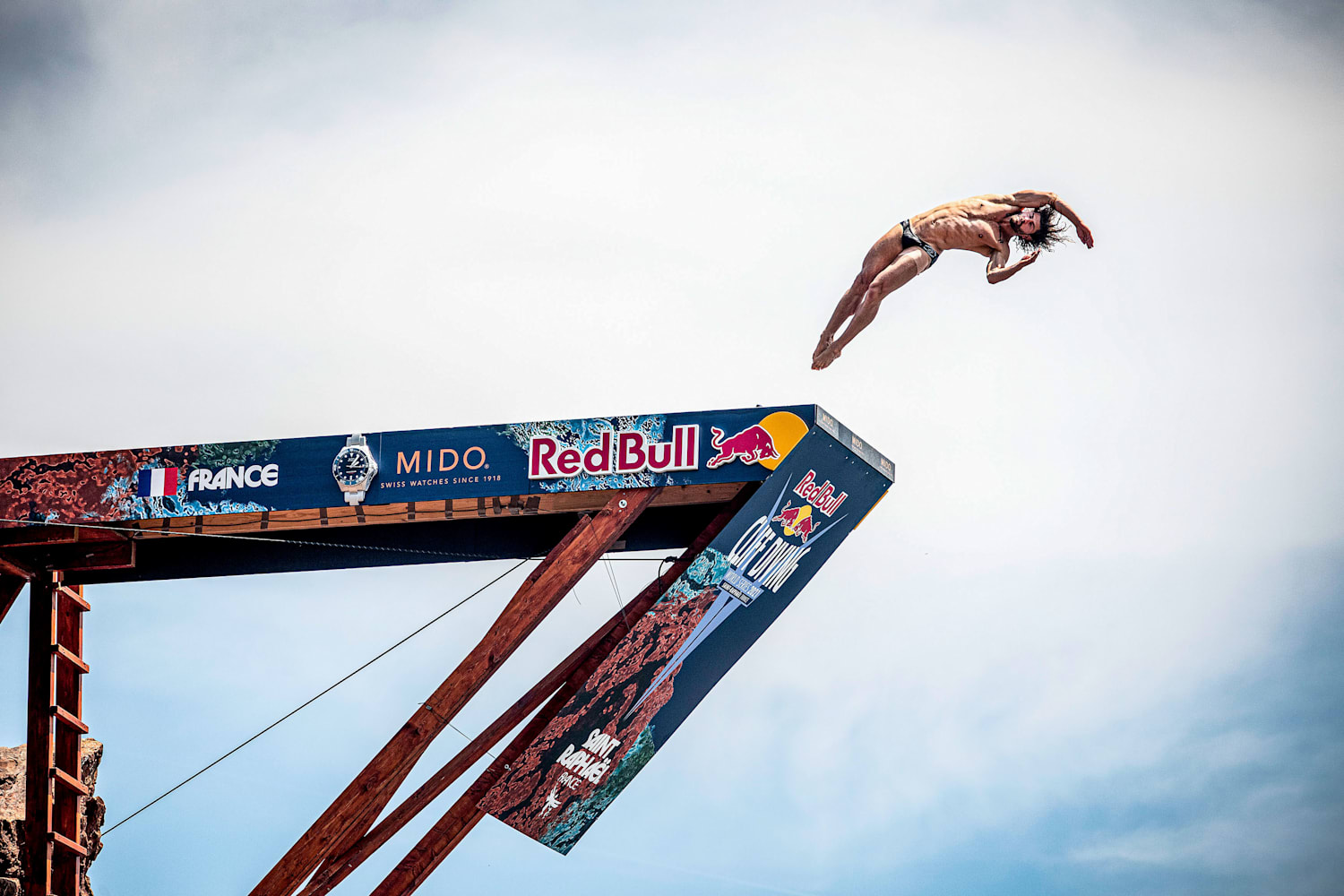About
Red Bull charges with sports
On June 18, La Rochelle hosted the fourth leg of the Red Bull Cliff Diving World Championship. Prior to the start of this competition, Markus Obrist and Alexandra Metral-Pander, respectively Chief Marketing Officer and Communications Manager of Red Bull France, agreed with Sport Strategies to review the strategy of the Austrian energy drink in sports marketing.
How long has Red Bull been involved in sports marketing?
Markus Obrist: Sport has been a passion for Red Bull since the beginning. And its owner, Dietrich Mateschitz, loves sports. The first sporting event was the Red Bull Dolomitenmann. This concept is similar to the Red Bull Elements that took place in Talloires [note: a competition open to amateurs, bringing together the best athletes from four different disciplines: rowing, cross country, paragliding, mountain biking].
Alexandra Metral-Pander: Red Bull Elements is one of our hundreds of events around the world.
You are the designer and promoter of Red Bull Elements, Red Bull Linecatcher (freeskiing) or Red Bull King Of Rock (street basketball). How do you explain the brand's success in sports?
MO: It's by bringing in partners. There is real potential. This is a moment that we are developing, we have not done this before. Taking a cue from Red BullElements and other partners, we have helped build brand credibility. It all depends on the type and strategy of the event. I also think it's a unique combination of brand and product. Our brand's unique vision is truly about giving wings to ideas and people. The combination of these two factors is an important reason for our success. Read more about the evolution and impact of Red Bull on the sport here - https://f1chronicle.com/history-of-the-red-bull-ring-evolution-and-impact/
AMP : We have more and more brands associated with our events because they recognize the quality and especially the value of the media. Red Bull Elements had Adidas, Nissan and Suunto. The Red Bull Linecatcher featured brands such as Orage (ski wear), Street (goggles). When a brand is associated with one of our events, it has a good chance of being featured in Redbulletin, our magazine with a circulation of 4.6 million.
Want to clear up your visibility in sports?
AMP: Just to avoid confusion because there is, everyone should understand that we are not a partner of our events. We are fighting to make people understand that we are not a classic sponsor. In Formula 1 we are not team sponsors. Toro Rosso and Red Bull Racing belong to us. We are the owner. The same goes for football or hockey clubs. We want to take small clubs like the New York Red Bulls every time. In France, we would not buy or sponsor Olympique Lyon. This is not our philosophy at all. We really want to buy small clubs, grow with them and bring them to the highest level. Here's what we did with the German team: Red Bull Leipzig, 4th division club. We want to do like Red Bull Racing. This team and Toro Rosso were sold and were worth nothing on the grid. And maybe it is precisely because we do things differently than everyone else that it works. We don't necessarily know the miracle recipe. To explain the success, I think that we do not compromise on quality either with the people with whom we build events, or with the relationships that we have with the authorities, the organizers. We try to tie the packages that are at the top. We don't say that what we do is 100% perfect.
MO: Being a team owner gives you other opportunities as well. The will of Red Bull, Mr Mateschitz, is always to develop the sport in a different way. So he created Redbulletin (a branded magazine) and for F1 a welcoming space in the paddock called the Red Bull Energy Station, welcoming journalists, mechanics, drivers, teammates.
How do you rate the 2010/2011 season for Red Bull in sports marketing?
MO: When Red Bull was in F1, it was a big achievement, not only to get the title [note: driver's title with Sebastian Vettel and best constructor], but how Red Bull won it. It was fantastic for the brand, the employers. We do this not only for emotions, but also for sales. I think Red Bull is happy with the way it is doing globally and also in France. So yes, the 2010/2011 season was a success.
Financial success too?
MO: Financially yes, but I don't know the details. Judging by the numbers, for the first time, more than 4 billion cans were sold worldwide. In 2011, we will sell over 100 million cans for the first time in France.
Read also: How do video games affect slot machines?
- All the details of mobile online casinos in Australia will tell you
- Bitcoin Blender - Bitcoin mixer - Mixer BTC - TOP 10 BITCOIN MIXERS
- online gokkast bonus - games casino gokkast gratis - beste online casino no deposit aanmeldbonus - casino gokkastspellen gratis - gokkast online voor echt geld
- Nopeat Nettikasinot 2023
- Casinò Online Stranieri Esteri E Accettano Italiani 2023

